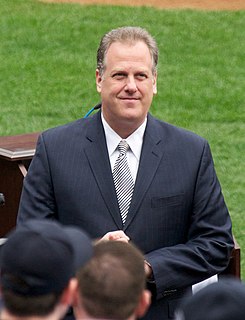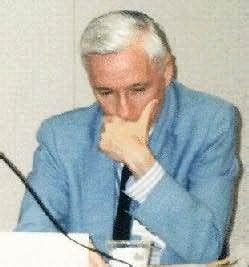A Quote by Stewart Brand
Every interview with a public figure should include the question "What have you been wrong about, and how did that change your views?" The answer will tell us if the person is intellectually honest or a tale spinner with delusions of infallibility.
Related Quotes
Curiosity and listening [are the principles to an excellent interview]. I never go into an interview with a dedicated list of questions in which I will not deviate. You must be curious about the subject and listen to his answer and ask the next question off that rather than the next question on your list.
I have no question that the Roman Catholic Church teaches that abortion in virtually all circumstances is wrong. I think the church's position at all times in modern history has been that it is unequivocally opposed to abortion.But that's not the question for a Catholic who is a public official. I happen to subscribe to the church's position as a person. Still the question, as Governor Mario Cuomo suggested, is: what is your obligation as a civic leader? I agree entirely with John F. Kennedy. I answer only to my conscience in my public life and that's that.
I feel that other people's suggestions are very dangerous. Yet, I can't say that they are always destructive or not useful. Perhaps, rather than having other people tell you how you should improve your work, they should just tell you how they understand your work, what they got out of it, so that you can figure out yourself if what you did was right or wrong.
If you are offended by reading views that disagree with yours, then yes, you will be offended. However, it is not gratuitously offensive, it simply puts an argument, and if your views are strong enough, as I believe they are, you will be able to defend your views. You will not say, "Oh, it's offensive, it's offensive." You will say "No, you are wrong here and you are wrong here," and that's what you should do.
My practise as a scientist is atheistic. That is to say, when I set up an experiment I assume that no god, angel, or devil is going to interfere with its course; and this assumption has been justified by such success as I have achieved in my professional career. I should therefore be intellectually dishonest if I were not also atheistic in the affairs of the world. And I should be a coward if I did not state my theoretical views in public.
Ace of Spades says that this became clear to him in a revelation one night. He was watching Chris Matthews interview [Barack] Obama, and he didn't get one question! He didn't ask Obama one question about how Obamacare works. Every question was one degree or another: How do you feel about [John] Boehner opposing it? How do you feel about it? What will make you happy? Do you think you can get it? [It] was irrelevant!
Do not ask the stones or the trees how to live, they can not tell you ; they do not have tongues; do not ask the wise man how to live for, if he knows , he will know he cannot tell you; if you would learn how to live , do not ask the question; its answer is not in the question but in the answer, which is not in words; do not ask how to live, but, instead, proceed to do so.
Had we lived, I should have had a tale to tell of the hardihood, endurance and courage of my companions which would have stirred the heart of every Englishman. These rough notes and our dead bodies must tell the tale, but surely, a great rich country like ours will see that those who are dependent on us are properly provided for.
We can each sit and wait to die, from the very day of our births. Those of us who do not do so, choose to ask - and to answer - the two questions that define every conscious creature: What do I want? and What will I do to get it? Which are, finally, only one question: What is my will? Caine teaches us that the answer is always found within our own experience; our lives provide the structure of the question, and a properly phrased question contains its own answer.
I have so often been asked the question: "But how did you come to think of The Scarlet Pimpernel?" And my answer has always been: "It was God's will that I should." And to you moderns, who perhaps do not believe as I do, I will say, "In the chain of my life, there were so many links, all of which tended towards bringing me to the fulfillment of my destiny."
There are very few errors and false doctrines of which the beginning may not be traced up to unsound views about the corruption of human nature. Wrong views of the disease will always bring with them wrong views of the remedy. Wrong views of the corruption of human nature will always carry with them wrong views of the grand antidote and cure of that corruption.
We're affable guys in They Might Be Giants. We're not gonna do the periscope-down thing, but it's a little bit mind-bending. The biggest struggle is trying to figure out a way to back up far enough in your answer that it can be read without the context of the question. Every declarative statement you see that comes out of an interview with somebody is actually in response to a question. So it's sort of like this very real interpersonal dance where one of the people involved is invisible.



































